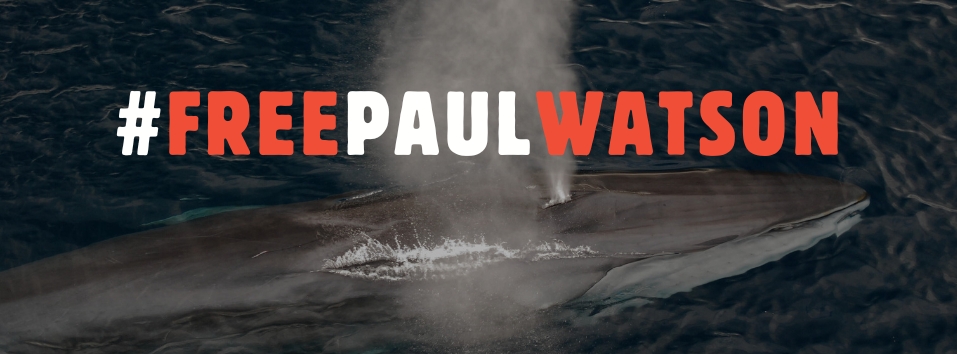Elsa Cabrera, Cetacean Conservation Center and Juan Carlos Cárdenas, Centro Ecoceanos
On Sunday 21 July, American-Canadian whale and ocean advocate Paul Watson was arrested by Danish police in Nuuk, the capital of Greenland, a self-governing territory under Danish rule. Watson is the former founder of the citizens’ group Sea Shepherd, world-renowned for saving more than 5,000 whales from Japan’s 30-year illegal slaughter in the Southern Ocean Whale Sanctuary. After leaving the organisation due to internal conflicts, the environmental activist founded the Captain Paul Watson Foundation (CPWF) in 2022 to continue direct action in defence of marine life.
Watson and his crew had landed in the John DeJoria to refuel before heading into the North Pacific. The ship’s objective was to intercept the new Japanese factory ship, the Kangei Maru, which has recently begun a controversial commercial hunt for fin whales, the second largest species after the blue whale.
Caught in the ambush
What began as a new whale-saving expedition ended abruptly due to an Interpol Red Notice, which was kept confidential until the time of the arrest. In 2012, the Japanese government issued such a notice, arguing that incidents in 2010 between the illegal Japanese whaling fleet and Sea Shepherd in the Southern Ocean had caused ‘damage and injury’. However, the arrest warrant went offline a few months ago, giving the activist a false sense of security.
The secret reactivation of the Interpol Red Notice coincides with the launch of Japan’s new factory ship, the Kangei Maru, so the real motivation behind the arrest appears to be political and aimed at intimidating opponents of Japan’s whaling operations. According to CPWF, the size and range of the new whaling vessel indicates that Japan intends to resume commercial whaling in international waters, including the Southern Ocean Whale Sanctuary, in 2025.
On 1 August, the Japanese government requested Watson’s extradition, and the Danish Ministry of Justice is due to decide next Thursday (15 August) whether to accept or reject the request. If accepted, Watson could face a 15-year sentence, which for a 75-year-old man could mean spending the rest of his life in prison.
Japanese ‘hostage justice’ vs. Danish justice system
According to a Human Rights Watch report published in 2023, Japan’s so-called ‘hostage justice’ system denies criminal suspects due process and a fair trial, and if the Danish authorities accept Japan’s extradition request, the future for one of the world’s most historic marine conservationists will be bleak.
While in pre-trial detention in Japan, Watson will be subject to the same abusive treatment as those suspected of serious crimes. This includes deprivation of the right to remain silent, interrogation without a lawyer, coerced confessions under pressure and constant surveillance. For Kanae Doi, Japan director at Human Rights Watch, the abuses of the hostage justice system have ‘destroyed lives and families and led to wrongful convictions’.
In contrast, the Danish justice system is recognised worldwide for its quality and progressive approach to ensuring respect for human rights and equality before the law. It is therefore urgent that the Danish judiciary do not become complicit in the Japanese hostage justice system and rejects the extradition request.
When marine criminals become prosecutors
Monitoring, investigating and taking action against individuals or organisations that violate environmental laws and cause damage to the environment is known as environmental regulation. Enforcement refers to the actions taken by authorities, agencies or individuals to ensure compliance with environmental laws and regulations.
For more than thirty years, the Japanese government illegally hunted tens of thousands of whales in the Southern Ocean. It began its activities after reaching an agreement with the United States to develop the so-called ‘scientific’ whaling following the adoption of the moratorium in 1986. Catches increased even after 1994, when the Southern Ocean was declared a whale sanctuary. It was only in 2016 that Japan was forced to stop whaling in the Antarctic, following a landmark ruling by the International Court of Justice in 2014 that declared the slaughters illegal.
For three decades, Japan unilaterally removed tens of thousands of minke whales from the Antarctic marine ecosystem. Thanks to non-lethal whale research, science has shown that every living whale plays a critical role in issues as important as ocean productivity and combating climate change. The illegal capture of each of these whales by the Japanese government is both a legal and an environmental crime.
Watson’s actions in 2010 are therefore in line with environmental advocacy and enforcement. It is ironic, then, that despite having illegally killed tens of thousands of whales for three decades, the Japanese state is now attempting to criminalise the legitimate right of authorities, organisations or, in this case, citizens, to ensure compliance with environmental laws and regulations.
Growing global outrage
Since Paul Watson’s surprise arrest two weeks ago, global outrage has been expressed in countless actions and calls for his release. On 23 July, just two days after his arrest, French President Emmanuel Macron said he would put pressure on the Danish authorities to prevent his extradition. This comes on top of several petitions calling for his release, which together have already garnered the support of several million people around the world.
Recently, the French newspaper Le Monde published a letter signed by prominent figures from the artistic, political and academic worlds[1], calling on the United Nations to intervene with Japan to secure Paul Watson’s release. In the OpEd, the authors state that to keep Watson in detention is to ignore the principles of international law in favour of the interests of a single country, to the detriment of all humanity. They add that the defence of whales is not an environmentalist pretext, but a vital scientific necessity to maintain the balance of the oceans and preserve the biodiversity essential to human survival. And they conclude that freeing Watson and holding the real offender, the Japanese state and its anachronistic, illegal and morally questionable whaling practices, to account is a responsibility shared by all.
A call to action in defence of life
The Cetacean Conservation Centre and the Ecocéanos Centre, are civil society organisations with a history of defending the right to protect marine biodiversity – especially marine mammals – from the criminal actions of states and corporations. The organizations join the global call for the Danish authorities to reject the extradition request to Japan for Paul Watson and to demand his immediate release. They invite all readers, civil society organisations and the scientific community to add their names to the call for the defence of life and the oceans; and the application of existing international rules and regulations for the conservation of marine biodiversity and the protection of human rights.
[1] Dominique Bourg, filósofo y académico franco-suizo; Laura Cazador, periodista y cineasta suiza; Arthur Dahl, presidente del Foro Internacional del Medio Ambiente y ex director ejecutivo adjunto del Programa de las Naciones Unidas para el Medio Ambiente; Olivier De Schutter, relator especial sobre la extrema pobreza y los derechos humanos en las Naciones Unidas; Isabelle Durant, experta sobre el derecho al desarrollo en el Consejo de Derechos Humanos de las Naciones Unidas; Benjamin Joyeux, periodista y militante ecologista, consejero regional de Auvernia-Ródano-Alpes; Jacques Martenot, militante por la no violencia y la paz; Philippe Roch, antiguo director de WWF Suiza y de la Oficina Federal de Medio Ambiente; Lisa Silvestre, representante del Movimiento por la Paz del Gran Ginebra; Marie Toussaint, eurodiputada verde, cofundadora de Notre Affaire à tous.



